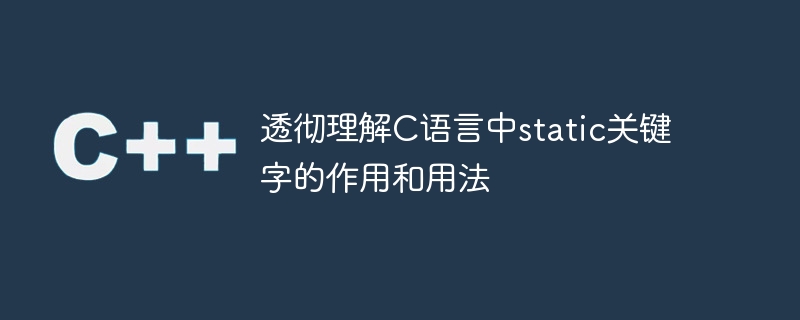Home >Backend Development >C++ >In-depth exploration of the functions and applications of the static keyword in C language
In-depth exploration of the functions and applications of the static keyword in C language
- WBOYWBOYWBOYWBOYWBOYWBOYWBOYWBOYWBOYWBOYWBOYWBOYWBOriginal
- 2024-02-19 10:39:07853browse

Thoroughly understand the role and usage of the static keyword in C language
In C language, the static keyword has an important role and usage. It can be applied to variables, functions, and structures to change their scope and life cycle.
- Static variables
Static variables are defined inside the function, but their life cycle is similar to that of global variables. The difference is that its scope is limited to the function in which it is defined. Static variables are only initialized once each time the function is called and will not be reassigned. This allows static variables to retain their original values between function calls.
The following is a sample code:
#include <stdio.h>
void increment() {
static int count = 0; // 静态变量
count++;
printf("变量 count 的值为:%d
", count);
}
int main() {
increment(); // 输出:变量 count 的值为:1
increment(); // 输出:变量 count 的值为:2
increment(); // 输出:变量 count 的值为:3
return 0;
}- Static function
The scope of a static function is limited to the current source file and cannot be called by other source files. Its main function is to restrict the access rights of functions to avoid conflicts with functions of the same name in other source files.
The following is a sample code:
#include <stdio.h>
static void helper() {
printf("这是一个静态函数。
");
}
void main() {
helper(); // 输出:这是一个静态函数。
return 0;
}- Static structure members
In C language, the structure can contain member variables and member functions, you can use static Modify the members of the structure to make them static members of the structure. Static structure members can be shared by all the structure objects, rather than each object having an independent copy.
The following is a sample code:
#include <stdio.h>
struct Point {
int x;
int y;
static int count; // 静态成员
};
int Point::count = 0; // 静态成员的初始化
void incrementCount() {
Point::count++;
}
int main() {
Point p1;
Point p2;
incrementCount();
printf("p1 的 count 值为:%d
", p1.count); // 输出:p1 的 count 值为:1
printf("p2 的 count 值为:%d
", p2.count); // 输出:p2 的 count 值为:1
return 0;
}Through the above sample code, we can see the various applications of the static keyword in C language. It can not only change the scope and life cycle of variables, but also restrict the access permissions of functions and structure members, helping to improve the maintainability and reusability of code. It is very important for C language programmers to master the usage of static keyword.
The above is the detailed content of In-depth exploration of the functions and applications of the static keyword in C language. For more information, please follow other related articles on the PHP Chinese website!

